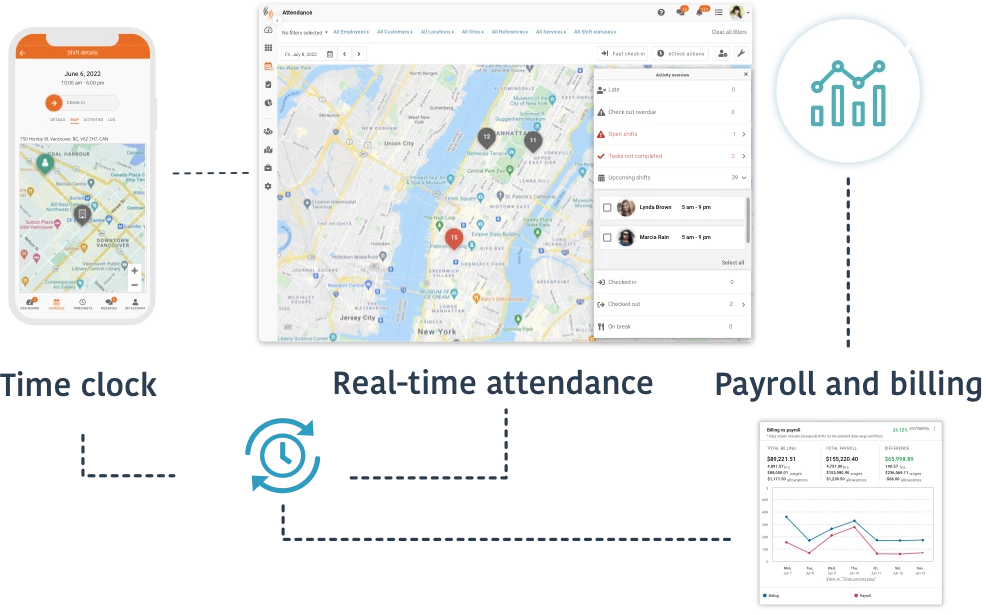Effective workforce management is the cornerstone of success in today’s fast-paced business world. Poor labor management can wreak havoc on your bottom line, causing increased costs, reduced productivity, and employee dissatisfaction. However, the adoption of advanced Labor Management Systems (LMS) can be a game-changer, revolutionizing the way you handle your workforce. They can help you to streamline operations, boost employee productivity, and propel your business towards growth and prosperity.
First, let’s look at how poor labor management can impact your organization.
The Impact of Poor Labor Management
Increased Labor Costs

One of the most significant impacts of poor labor management is the increase in labor costs. When schedules are not optimized, businesses may end up paying for more hours than necessary. This can lead to budget overruns and reduced profitability.
Decreased Productivity
Poorly managed labor can result in decreased productivity levels. Employees may not be assigned to the right tasks at the right times, leading to inefficiencies in workflow. This not only affects output but also morale within the workforce.
Employee Turnover
When employees are overworked or feel undervalued because of ineffective labor management, it can lead to high employee turnover rates. Replacing employees is costly and disruptive to the business.
Compliance Issues
Failure to adhere to labor laws and regulations can result in legal issues and fines. Poor labor management may lead to non-compliance, putting your business at risk.
The Advantages of Using Labor Management Systems
Improved Workforce Scheduling

Employee scheduling is the foundation of labor management. Labor Management Systems offer the ability to create optimized work schedules. By considering factors like employee availability, skills, and demand forecasting, LMS can ensure that the right people are in the right place at the right time.
Enhanced Employee Engagement
LMS can empower employees by giving them more control over their schedules and providing visibility into their work hours. This can lead to increased job satisfaction and reduced turnover. In fact, studies show that high employee engagement can improve workforce productivity. A recent Gallup study saw productivity increased by 18% in settings with high engagement.
Real-time Data Insights
Advanced LMS provides real-time data on labor costs, productivity, and compliance. This data enables informed decision-making and helps businesses adapt to changing circumstances quickly.
Integrating a labor management system with your time clocks can also improve the way you track labor. Improved time tracking paired with real-time data can help you save both time and money on important business functions such as payroll and billing. We talk more about that below.
Cost Savings
By optimizing labor schedules and reducing overtime, LMS can significantly reduce labor costs. This can lead to improved profitability for your business. Labor management systems like Celayix use automation, Ai and machine learning to handle cost-saving rules to manage employee scheduling. Not only do these tools boost cost savings, they can improve labor productivity.
Streamlined Payroll Processing

LMS can automate payroll processes, reducing administrative burden and the risk of errors. This ensures that employees are paid accurately and on time. Accurate data from multiple sources greatly reduce the liklihood of costly errors, while also speeding up the process.
How to Utilize Labor Management Systems
1. Choose the Right LMS
Select an LMS that aligns with your business needs and goals. Look for features that address your specific labor management challenges. Software like Celayix offers you a free trial to allow you to get up close and personal with the system before committing. You can also arrange a custom, free demo where our Solutions Advisors can talk through your specific business problems and how we can solve them.
2. Implement Proper Training

Ensure that your employees are adequately trained on how to use the LMS. This includes both managers and staff who will interact with the system. By introducing the system correctly to your team, employees performance can, and should improve! If you choose Celayix, you will have a dedicated implementation specialist, and continued ongoing support throughout your subscription.
3. Data Integration
Integrate your LMS with other relevant systems, such as HR, timekeeping, and payroll software. This ensures seamless data flow and reduces manual data entry. Celayix integrates and partners with a wide range of tools to give you a fully rounded suite of tools to run your business.
4. Define Key Performance Indicators (KPIs)
Identify the key metrics and KPIs that matter most to your business. These could include labor costs, productivity levels, or compliance rates.
5. Monitor and Analyze Data
Regularly monitor and analyze the data generated by your LMS. Use this information to make informed decisions and continuously improve your labor management processes. Without this monitoring and analysis, you may not notice the improved performance of your team.
6. Adjust and Optimize

Don’t be afraid to make adjustments to your labor schedules and practices based on the insights provided by your LMS. Continuous optimization is key to reaping the benefits.
7. Employee Feedback
Encourage employee feedback on the LMS and its impact on their work experience. This can help identify areas for improvement and ensure that the system meets everyone’s needs.
The power of advanced Labor Management Systems cannot be underestimated. They have the potential to transform the way businesses manage their workforce, leading to improved productivity, cost savings, and employee satisfaction. By understanding the impact of poor labor management, recognizing the advantages of LMS, and implementing them effectively, businesses can harness this powerful tool to drive growth and success in today’s competitive environment. If you’d like to hear more about how Celayix can help, get in touch today or sign up with a free trial.




